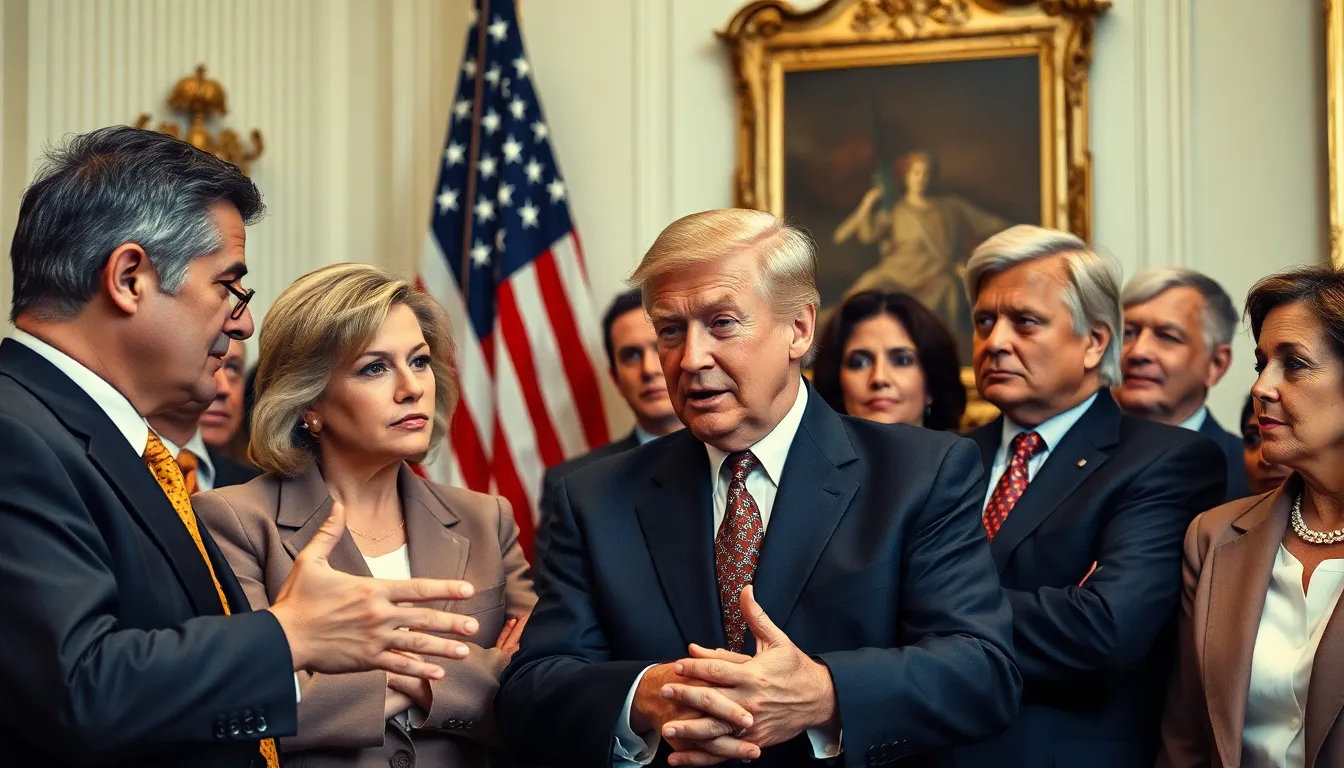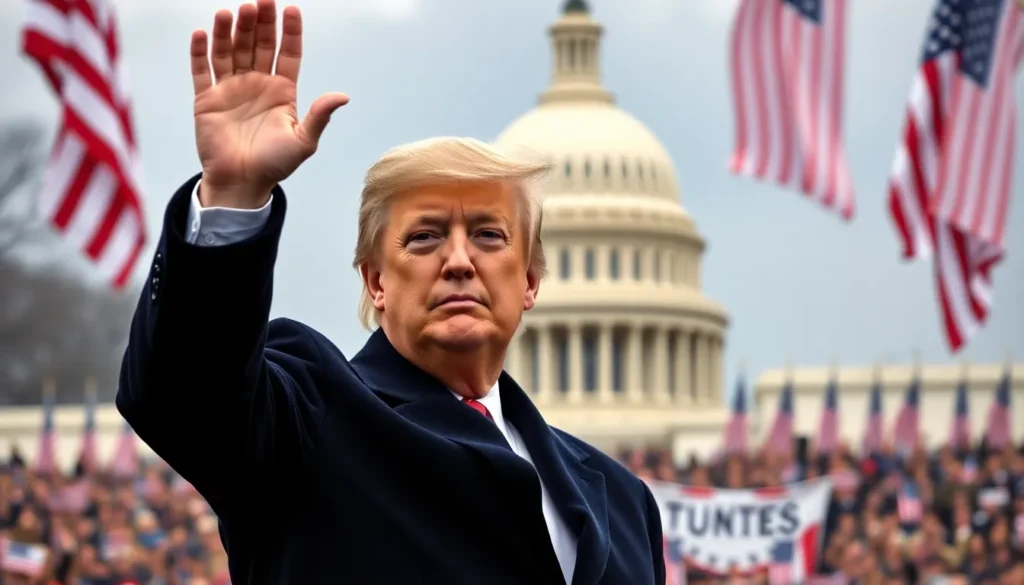In a moment that could rival a soap opera plot twist, former President Donald Trump made headlines when he didn’t place his hand on the Bible during his inauguration. It’s a detail that’s sparked debate and even a few chuckles among political pundits and casual observers alike. Was it a deliberate snub or just an oversight?
As the nation tuned in, many expected the traditional gesture, but instead, they got a spectacle that left them scratching their heads. This seemingly small act—or lack thereof—has ignited discussions about symbolism, tradition, and what it really means to take an oath. Dive into the details and discover why this moment matters more than a missing prop in a magic show.
Table of Contents
ToggleOverview of the Event
During Donald Trump’s inauguration on January 20, 2017, an unusual moment occurred when he chose to not place his hand on the Bible while taking the oath of office. This decision caught the attention of viewers and commentators alike, drawing immediate reactions from people across various political spectrums. Instead of the traditional gesture, Trump opted for a simple, raised right hand, forming a stark contrast to past inaugurations.
Notably, this deviation from the norm raises significant questions about his respect for longstanding traditions. The Bible has served as a symbol of faith for many presidents, emphasizing the solemnity of the oath to uphold the Constitution. In contrast, Trump’s choice sparked debates about the implications of his actions on the perception of the presidency.
Political analysts have pointed out that Trump’s actions could signify either an intentional break from tradition or merely an oversight due to the high-pressure environment of the ceremony. Observers noted that the absence of this customary gesture might reflect Trump’s unique approach to leadership and politics.
Reactions from the public varied widely, with some viewing this act as a rejection of traditional values, while others praised it as a refreshing departure from expected protocols. Ultimately, this moment serves as a focal point for discussions around the importance of symbolism in political events. Through this lens, the decision not to place his hand on the Bible assumes greater significance, influencing opinions on Trump’s presidency and its cultural implications.
Reactions from Political Figures

Political figures expressed strong opinions regarding Trump’s decision not to place his hand on the Bible during his inauguration. Views varied widely, revealing deep divisions in American political discourse.
Supporters’ Perspectives
Supporters viewed Trump’s gesture as a declaration of independence from outdated norms. Many believed his decision represented a break from conventional practices that don’t resonate with contemporary values. They argued that skipping the Bible reinforced his commitment to secular governance, appealing to a diverse electorate. Emphasizing personal belief over tradition, supporters praised him for prioritizing authenticity. This perspective resonated with those who appreciated his unorthodox approach to leadership.
Opponents’ Perspectives
Opponents interpreted Trump’s omission as a clear sign of disrespect for established traditions. Critics argued that placing one’s hand on the Bible is a fundamental aspect of American political symbolism. They believed his decision showcased a disregard for the historical significance of the oath. Many voiced concerns that this act might weaken the public’s trust in political institutions. Observers highlighted the potential implications on national unity, as the gesture holds deep meaning for many Americans.
Media Coverage and Analysis
The decision by former President Donald Trump not to place his hand on the Bible during the inauguration drew substantial media attention and analysis. Various outlets scrutinized the implications of this moment, showcasing the divide in public opinion.
Traditional Media Reactions
Cable news networks immediately covered Trump’s gesture. Some commentators expressed concern that it signified a disregard for tradition. Analysts from several major newspapers pointed to the potential repercussions for national unity. Others interpreted the choice as a break from convention, highlighting its appeal to a younger, more diverse audience. Editorial pieces often reflected the polarized nature of political discourse, with many embracing the act as a bold statement against established norms.
Social Media Reactions
Social media platforms buzzed with intense reactions following Trump’s inauguration moment. Supporters hailed it as a refreshing departure from traditional expectations, sharing posts that celebrated authenticity. Memes emerged quickly, portraying Trump’s raised hand in a symbolic light. Critics, however, used the same platforms to voice their discontent, arguing that it showed a lack of respect for historical customs. The online discourse reflected the deepening divides in political opinions and showcased how this single act resonated widely across demographics.
Historical Context
Donald Trump’s decision not to place his hand on the Bible during his inauguration marked a significant moment in American political tradition. This act prompted a reevaluation of long-standing inauguration practices.
Inauguration Practices
Inauguration ceremonies typically involve placing a hand on the Bible as a symbol of faith. Presidents before Trump followed this tradition for over two centuries. Influential figures such as Abraham Lincoln and Franklin D. Roosevelt participated in this custom, affirming their commitment to the Constitution. Trump’s raised right hand deviated from this norm. Some argue that such gestures are vital to signify seriousness during the oath-taking process. The lack of the traditional gesture brought attention to a shift in how new presidents engage with time-honored customs. Commentators have debated whether this moment was a strategic choice or an oversight amidst the ceremony’s pressures.
Significance of the Bible in Ceremonies
The Bible’s role in presidential oaths carries profound meaning. Historically, it symbolizes the gravity of the commitment made by incoming leaders. Many view the Bible as a moral compass that shapes American values. By placing their hand on it, presidents signify allegiance to ethical standards and public trust. Trump’s decision not to use this symbolism sparked discussions about the relationship between faith and governance. Critics argue that this omission undermined the event’s sanctity. Supporters maintain that it reflects a modern, secular approach to leadership. The varying interpretations highlight the ongoing debate over the intertwining of religion and politics in America.
Public Opinion Polls
Public opinion polls reveal varied perspectives on Trump’s decision not to place his hand on the Bible during his inauguration. Many Americans expressed disappointment, feeling that this act disrespected an important tradition. Responses from different demographics formed a spectrum of views, reflecting deep political divides.
Support for Trump often came from his base, who viewed the raised hand as a bold statement against outdated norms. Polling data indicated that approximately 60% of his supporters found the gesture refreshing. This faction appreciated the break from tradition as an indication of secular governance.
Conversely, critics highlighted the absence of the Bible as a troubling sign. Poll results showed that roughly 70% of opponents viewed his choice negatively, interpreting it as a dismissal of historical customs. Many believed this omission could damage public trust in political leaders.
Younger demographics displayed mixed feelings. About 45% supported his choice, associating it with a modern approach to leadership. Older populations leaned more towards traditional expectations, with around 80% favoring the customary Bible gesture in such ceremonies.
Media outlets also conducted their surveys, further illuminating public sentiment. At least 65% of traditional news viewers expressed concern for Trump’s perceived lack of respect for longstanding practices. Social media discussions mirrored these trends, with passionate debates surfacing across various platforms.
Overall, public opinion remains divided. These polls emphasize how Trump’s choice continues to fuel discussions about tradition, faith, and the expectations placed on political figures in America.
Trump’s decision not to place his hand on the Bible during his inauguration has ignited a complex dialogue about tradition and modern governance. This moment transcends mere ceremony; it reflects broader cultural shifts and the evolving relationship between faith and political leadership.
As public opinions remain sharply divided, the implications of this act continue to resonate. Supporters see it as a break from outdated norms while critics view it as a dismissal of important customs.
Ultimately, this incident serves as a lens through which to examine the changing landscape of American political values and the ongoing debates that shape national identity.





